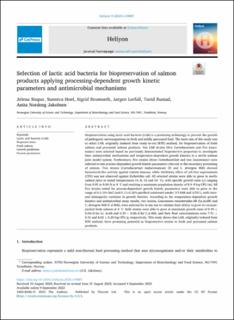| dc.description.abstract | Biopreservation using lactic acid bacteria (LAB) is a promising technology to prevent the growth of pathogenic microorganisms in fresh and mildly processed food. The main aim of this study was to select LAB, originally isolated from ready-to-eat (RTE) seafood, for biopreservation of fresh salmon and processed salmon products. Ten LAB strains (five Carnobacterium and five Leuconostoc) were selected based on previously demonstrated bioprotective properties to investigate their antimicrobial mechanisms and temperature-dependent growth kinetics in a sterile salmon juice model system. Furthermore, five strains (three Carnobacterium and two Leuconostoc) were selected to test process-dependent growth kinetic parameters relevant to the secondary processing of salmon. Two strains (Carnobacterium maltaromaticum 35 and C. divergens 468) showed bacteriocin-like activity against Listeria innocua, while inhibitory effect of cell-free supernatants (CFS) was not observed against Escherichia coli. All selected strains were able to grow in sterile salmon juice at tested temperatures (4, 8, 12 and 16 °C), with specific growth rates (μ) ranging from 0.01 to 0.04/h at 4 °C and reaching a maximum population density of 8.4–9 log CFU/ml. All five strains tested for process-dependent growth kinetic parameters were able to grow in the range of 0.5–5% NaCl and 0.13–0.26% purified condensed smoke (VTABB and JJT01), with inter- and intraspecies variation in growth kinetics. According to the temperature-dependent growth kinetics and antimicrobial assay results, two strains, Leuconostoc mesenteroides 68 (Le.m.68) and C. divergens 468 (C d.468), were selected for in situ test to validate their ability to grow in vacuum-packed fresh salmon at 4 °C. Both strains were able to grow at maximum growth rates of 0.29 ± 0.04/d for Le. m.68 and 0.39 ± 0.06/d for C.d.468, and their final concentrations were 7.91 ± 0.31 and 8.02 ± 0.25 log CFU/g, respectively. This study shows that LAB, originally isolated from RTE seafood, have promising potential as bioprotective strains in fresh and processed salmon products. | en_US |

